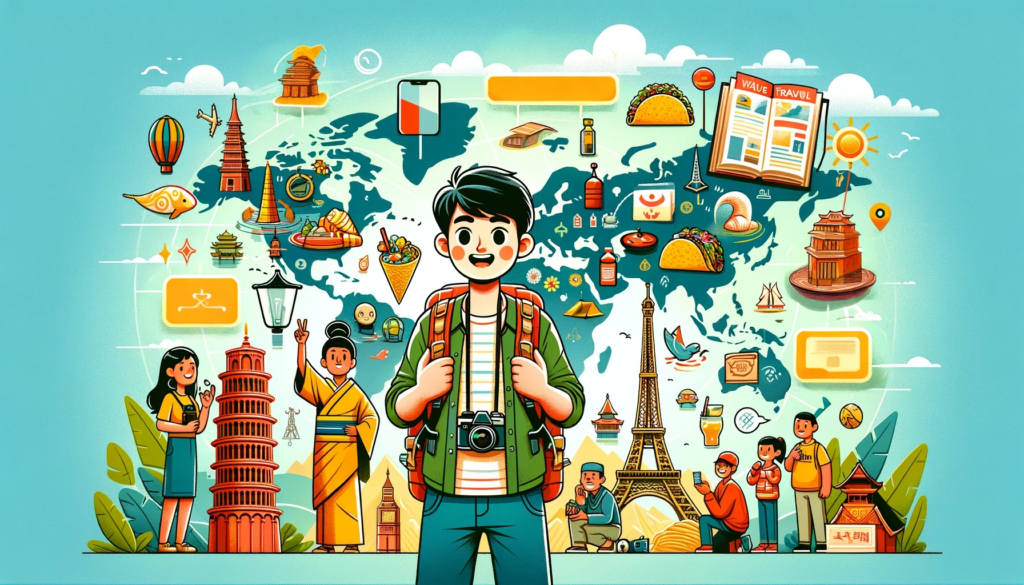Exploring Cultures: Travel Tips for Beginners

Traveling is fun. People fly in planes. Others go by boat. Some take long train rides. Many countries have different sights. Mountains, rivers and cities can be beautiful. You can meet many friends. They may speak other languages. It’s good to learn new words.
When you travel, pack light. Only take what you need. A map is very useful. It helps you find places. A camera is good too. You can take pictures. Remember to charge your camera.
Try new foods when away. Some may be spicy. Others are sweet or sour. Every place has special dishes. Eat where locals eat. It’s often cheaper and better. Drink water to stay healthy.
Always say ‘please’ and ‘thank you.’ It is polite. People like kind travelers. Learn how to say it. Learn it in their language too. Smiling is always good. It shows friendship.
Be safe when you travel. Watch your things. Keep money close to you. Don’t walk alone at night. Stay in safe places. Plan your trip well. Then, enjoy your adventure.
Text Analysis
CEFR Level Card
General Level: A2.1
Vocabulary: A2.1
Verb Forms: A1.4
Sentences: A1.3
Wordlist
charge VERB B1 x1
Definition (En):
- an impetuous rush toward someone or something
n. (criminal law) a pleading describing some wrong or offense
n. the price charged for some article or service
n. the quantity of unbalanced electricity in a body (either positive or negative) and construed as an excess or deficiency of electrons
close ADV B1 x1
Definition (En):
- move so that an opening or passage is obstructed; make shut
v. become closed
v. finish or terminate (meetings, speeches, etc.)
v. complete a business deal, negotiation, or an agreement
friendship NOUN B1 x1
Definition (En):
- the state of being friends (or friendly)
local NOUN B1 x1
Definition (En):
- public transport consisting of a bus or train that stops at all stations or stops
a. relating to or applicable to or concerned with the administration of a city or town or district rather than a larger area
a. of or belonging to or characteristic of a particular locality or neighborhood
a. affecting only a restricted part or area of the body
other NOUN B1 x2
Definition (En):
- not the same one or ones already mentioned or implied
s. recently past
s. very unusual; different in character or quality from the normal or expected
sight NOUN B1 x1
Definition (En):
- an instance of visual perception
n. anything that is seen
n. the ability to see; the visual faculty
n. a range of mental vision
sour ADJ B1 x1
Definition (En):
- a cocktail made of a liquor (especially whiskey or gin) mixed with lemon or lime juice and sugar
n. the taste experience when vinegar or lemon juice is taken into the mouth
v. go sour or spoil
v. make sour or more sour
spicy ADJ B1 x1
Definition (En):
s having an agreeably pungent taste
s producing a burning sensation on the taste nerves
s suggestive of sexual impropriety
traveling NOUN +∞ x1
Definition (En):
n the act of going from one place to another
v change location; move, travel, or proceed, also metaphorically
v undertake a journey or trip
v make a trip for pleasure
v travel upon or across
v undergo transportation as in a vehicle
v travel from place to place, as for the purpose of finding work, preaching, or acting as a judge
Phrases and Idioms
PHRASE | COUNT | SENTENCES |
pack light | 1 |
|
Reading Comprehension Exercises
True / False
- Taking a boat is one way to travel.
- Everywhere you go, the food will taste the same.
- You should not smile at people in other countries.
- It’s important to learn a few words in the local language.
- When traveling, you should bring lots of luggage with you.
- Mountains and rivers might not be interesting to see.
- It is a good idea to have a map when traveling.
- You should only drink water when you are sick.
- Having a camera with you can help keep memories of your trip.
- Traveling alone at night is a safe thing to do.
It's Your Turn!
Create your multiple choice questions for this reading lesson just in seconds!
Step 1: Click the button to copy the reading text
Step 2: Go to Exercise Creator
Step 3: Paste the reading text
Select question type (Multiple Choice)
Click “Create” and your questions will be ready in seconds!
Short Answer Questions
- What can help you find places when you travel?
- What should you do with your camera before traveling?
- Why should you eat where the locals eat?
- What types of food might you try when traveling?
- What is one thing you should always do to be polite?
- What shows friendship to others when you travel?
- When traveling, why should you keep money close to you?
- What should you avoid doing at night for safety?
- What do many countries have that can be beautiful?
- What can you make when you meet many friends while traveling?
Multiple Choice Cloze
Traveling is ___1___. People fly in planes. Others go by boat. Some take long train ___2___. Many countries have different sights. Mountains, rivers and cities can be ___3___. You can meet many friends. They may speak other ___4___. It’s good to learn new words.
When you travel, pack ___5___. Only take what you need. A map is very ___6___. It helps you find places. A camera is good too. You can take pictures. Remember to charge your ___7___.
Try new foods when away. Some may be spicy. Others are sweet or ___8___. Every place has special dishes. Eat where locals eat. It’s often cheaper and better. Drink water to stay ___9___.
Always say ‘please’ and ‘thank you.’ It is ___10___. People like kind travelers. Learn how to say it. Learn it in their language too. Smiling is always good. It shows friendship.
Be safe when you travel. Watch your things. Keep money close to you. Don’t walk alone at night. Stay in safe places. Plan your trip well. Then, enjoy your adventure.
1) A. boring B. hard C. fun D. busy
2) A. rides B. walks C. jogs D. drives
3) A. ugly B. noisy C. beautiful D. scary
4) A. languages B. words C. sounds D. jokes
5) A. heavy B. light C. big D. small
6) A. useful B. expensive C. colorful D. heavy
7) A. phone B. camera C. bag D. ticket
8) A. old B. sour C. hot D. cold
9) A. happy B. healthy C. tired D. hungry
10) A. rude B. polite C. funny D. sad
Answer Key
True / False Answers
- True
Explanation: The text says that people can travel by boat, which means it is one way to travel.
(“Others go by boat.”)
- False
Explanation: The text talks about different types of food, like spicy, sweet, and sour, which means food tastes different in different places.
(“Some may be spicy. Others are sweet or sour.”)
- False
Explanation: The text says smiling is good and shows friendship, which means you should smile at people.
(“Smiling is always good. It shows friendship.”)
- True
Explanation: The text suggests learning to say ‘please’ and ‘thank you’ in the local language, meaning it’s important.
(“Learn how to say ‘please’ and ‘thank you’. Learn it in their language too.”)
- False
Explanation: The text advises to pack light and only take what you need, which means not bringing lots of luggage.
(“When you travel, pack light. Only take what you need.”)
- False
Explanation: The text states that mountains and rivers can be beautiful, indicating they might be interesting to see.
(“Mountains, rivers and cities can be beautiful.”)
- True
Explanation: The text says that a map is very useful, which suggests it’s a good idea to have one.
(“A map is very useful.”)
- False
Explanation: The text tells you to drink water to stay healthy, not just when sick.
(“Drink water to stay healthy.”)
- True
Explanation: The text says that a camera is good because you can take pictures, which helps keep memories of your trip.
(“A camera is good too. You can take pictures.”)
- False
Explanation: The text advises not to walk alone at night and to stay in safe places, indicating it’s not safe to travel alone at night.
(“Don’t walk alone at night. Stay in safe places.”)
It's Your Turn!
Create your multiple choice questions for this reading lesson just in seconds!
Step 1: Click the button to copy the reading text
Step 2: Go to Exercise Creator
Step 3: Paste the reading text
Select question type (Multiple Choice)
Click “Create” and your questions will be ready in seconds!
Short Answer Answers
- A map.
Explanation: The text says a map is useful because it helps you find places.
(“A map is very useful. It helps you find places.”)
- Charge it.
Explanation: The text reminds to charge your camera before using it to take pictures.
(“Remember to charge your camera.”)
- It’s cheaper and better.
Explanation: The text suggests eating where locals eat because it’s often cheaper and the food is better.
(“Eat where locals eat. It’s often cheaper and better.”)
4. Spicy, sweet, sour.
Explanation: The text mentions you can try foods that are spicy, sweet, or sour when traveling.
(“Some may be spicy. Others are sweet or sour.”)
- Say ‘please’ and ‘thank you’.
Explanation: The text states saying ‘please’ and ‘thank you’ is polite and should always be done.
(“Always say ‘please’ and ‘thank you.’ It is polite.”)
- Smiling.
Explanation: The text indicates that smiling is good because it shows friendship.
(“Smiling is always good. It shows friendship.”)
- To be safe.
Explanation: The text advises keeping money close to be safe.
(“Keep money close to you.”)
- Walking alone.
Explanation: The text suggests not walking alone at night to stay safe.
(“Don’t walk alone at night.”)
- Mountains, rivers, cities.
Explanation: The text mentions that many countries have mountains, rivers, and cities that can be beautiful.
(“Mountains, rivers and cities can be beautiful.”)
- Learn new words.
Explanation: The text suggests that when you meet friends who speak other languages, it’s an opportunity to learn new words.
(“You can meet many friends. They may speak other languages. It’s good to learn new words.”)
Multiple Choice Cloze Answers
- C
Explanation: ‘Fun’ is the correct word because traveling is enjoyable.
- A
Explanation: ‘Rides’ is correct as it refers to taking the train.
- C
Explanation: ‘Beautiful’ is correct as it describes sights that are aesthetically pleasing.
- A
Explanation: ‘Languages’ is correct; people can speak languages that are different from your own.
- B
Explanation: ‘Light’ is correct as it means not to carry too many things.
- A
Explanation: ‘Useful’ is correct as it describes the map’s helpfulness.
- B
Explanation: ‘Camera’ is correct as you need to charge it to take pictures.
- B
Explanation: ‘Sour’ is correct; it’s one of the tastes mentioned.
- B
Explanation: ‘Healthy’ is correct as it links to drinking water and well-being.
- B
Explanation: ‘Polite’ is correct as it describes good manners like saying ‘please’ and ‘thank you.’
Your Own Reading Lesson
Create Your Own Lesson with Cathoven AI
You can create your own reading lesson based on your interests or those of your students!
Go to;
Type the topic you are interested in, select the level and genre you are looking for, and click Generate!
Paste the reading text you generated and get a detailed analysis of your text.
Select the type of exercise, paste the reading text, and click Create!
Your reading lesson is ready!




